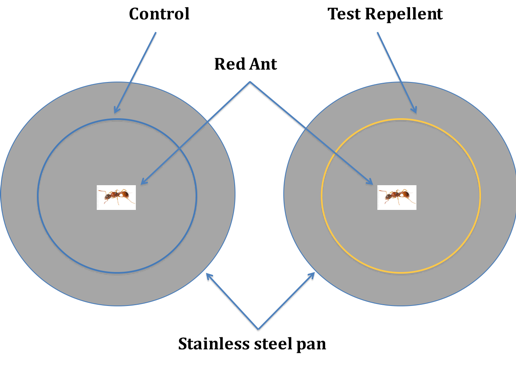Repulsion of Ants Using Non-Toxic Household Products
(1) Joseph T. Henley Middle School, Crozet, Virginia, (2) University of Virginia School of Medicine, Charlottesville, Virginia
https://doi.org/10.59720/19-057
Ant invasion causes damage exceeding $5 billion annually in North America. Commercial repellents often contain chemical compounds that are potential carcinogens and maybe harmful to human health. In this study, we aimed to identify natural products with ant-repelling properties. We tested chalk, cinnamon, ginger powder, lemon juice, rosemary powder, table salt, and turmeric powder using a custom ring apparatus designed to quantify ant-repellence. We discovered that cinnamon and lemon were the most effective ant repellents of the tested products. Specifically, we found that cinnamon oil and lemon juice increased the median time required for ants to exit the ring as compared to their vehicle controls; that the lipid-soluble component of cinnamon, i.e., oil, and the lipid-insoluble component of lemon, i.e., juice, were more efficacious at repelling ants than their counterpart fractions; that cinnamon oil and lemon juice repelled ants in a dose-dependent manner; that cinnamon oil was more efficacious than lemon juice; that lemon juice was more potent than cinnamon oil; and that cinnamon oil and lemon juice are synergistic in their ant-repellent properties. These data suggest that compounds found in non-toxic household products, such as cinnamon oil and lemon juice, could be used in low-dose combinations as potent, effective, eco-friendly, and safe ant repellents.
This article has been tagged with: